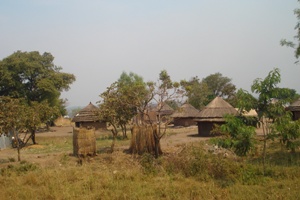FEATURE: Travellers pay high fares on South Sudan’s roads
By Philip Thon Aleu
December 25, 2008 (KOBOKO, Uganda) — With a lot of dust generated from the dry season roads and smoke from burning forests, travelling in Southern Sudan is like another prison. Yet the main road southward through Jonglei, Central and Eastern Equatoria States cuts through a beautiful relief of virgin forest, hills and mountains—a part of Africa described as a hope of the world given the increasing threat of global warming.

During holiday seasons fares increase extraordinarily, though normally they remain fairly constant despite fluctuating oil prices. Poor roads and high risks involved while trading in this region are some reasons that bus managers outlined when asked to explain abnormal differences in fares.
THE JOURNEY SOUTHWARD
For the cost of 50 SDG, a traveller can make the 3-4 hour journey from Bor to Juba along 190km of 50% upgraded road.
The Bor-Juba road is a vast and sparsely inhabited area. The relief is flat till Mugala, from which one can see hills and a raised plateau.
Local markets along the way serve travellers with the same items sold in the towns, including cold drinks and biscuits, as well as unique local products. As usual, children wave at passing buses with wide smiles while hunters and cattle keepers raise up their guns in greeting–a sign that disarmament has not taken full effect as the six month disarmament period elapses.
Southern Sudanese villagers, whose social and economic living standards don’t differ much from town dwellers, appear nevertheless more comfortable and happier. But settlers along the Bor-Juba road send their children to school elsewhere. A Mundari woman from Central Equatoria State said, “There are no schools here. You can take your child to Juba, Mugala or Sudan Safari (a Bor-Mundari co-shared school near Jameza).”
The Mundari community remains in the same living conditions as witnessed by this reporter in the early 1990s while displaced there during the split within the Sudan People’s Liberation Movement. Among the Mundari, asking villagers where health services are rendered is just trading a question for a question. “That drugs shop you mean?” a man replied.
Health centres on the road from Bor to Nimule, which spans the three states of Jonglei, Central and Eastern Equatoria, have slight differences, but villagers summarized them as “poorly serviced.” Nimule and Juba, however, have world-class hospitals accessible to town residents. Villages across the three states have nearly the same living conditions as each other.
FROM JUBA TO UGANDA
Not far from Mugala is Southern Sudan’s capital of Juba. A traveller from Juba to Nimule (about 180km) pays fifty Sudanese Pounds while from Juba to Kampala, a much longer distance of about 600km, one pays just ninety Sudanese Pounds.
As buses cut through the thick forests south of Juba, they must stop at numerous checkpoints where bus managers pay to pass. The checkpoints, drivers say, back their argument for why travellers should pay high fares to avoid the bus companies losing money. Sudan Tribune established that these check points contribute to high fares.
The road is hilly from Juba to Nimule on the Ugandan border. Careless drivers or faulty buses are commonly involved in accidents here, but construction of bridges is surging and by mid 2009, a great job is expected to be done. Indeed the autonomous Government of Southern Sudan will have a reason to brag on this service provided to a region marginalized by the Khartoum-based regime for centuries.
Telecommunication has greatly improved in recent months and only small areas have no telecommunication coverage. Boys grazing cattle can now inform fathers back home if a lion attacks his animals. Yet more common than wild invaders these days are the armed rustlers who raid cattle and kill owners should there be any resistance.
While living conditions remain fairly the same in both villages and towns in Southern Sudan, villagers trail behind in health and education sectors. Jonglei state, for example, has only a semi-modern hospital in the capital, Bor Town.
ROAD CONSTRUCTION IS PRIORITY
If the state government is to catch up shortly, road construction is the first priority, the Jonglei government has always argued.
But for now, a traveller has nothing to love staying on this road for hours. The effort made by the Southern government to reconstruct the Juba-Bor road has been challenged by what the government calls “limited budget.”
The situation in Central Equatoria is quite better, probably due to the status of hosting the Southern Sudan Government and the policies of the State authorities. Schools here follow Uganda curriculum, a system the Jonglei governor hailed on African Child Day in Bor.
Prices of commodities, bus fares and low production in villages should be handled with care by GoSS, say observers, in order to make living in Southern Sudan better. As Ugandans and Kenyans travel upcountry to celebrate Christmas, some South Sudanese take the opposite journey and end up spending their end of the year in foreign cities.
(ST)
